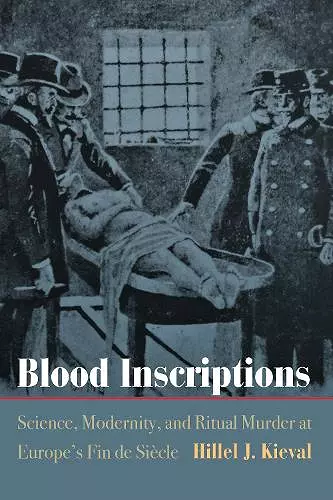Blood Inscriptions
Science, Modernity, and Ritual Murder at Europe's Fin de Siècle
Format:Hardback
Publisher:University of Pennsylvania Press
Published:15th Feb '22
Currently unavailable, and unfortunately no date known when it will be back

Although the Enlightenment had seemed to bring an end to the belief that Jews murdered Christian children for ritual purposes, charges of the so-called blood libel continued on either side of the turn to the twentieth century. Hillel J. Kieval examines four cases to consider how discredited beliefs became plausible to educated European elites.
Although the Enlightenment had seemed to bring an end to the widely held belief that Jews murdered Christian children for ritual purposes, charges of the so-called blood libel were surprisingly widespread in central and eastern Europe on either side of the turn to the twentieth century. Well over one hundred accusations were made against Jews in this period, and prosecutors and government officials in Germany, Austria-Hungary, and Russia broke with long established precedent to bring six of these cases forward in sensational public trials. In Blood Inscriptions Hillel J. Kieval examines four cases—the prosecutions that took place at Tiszaeszlár in Hungary (1882-83), Xanten in Germany (1891-92), Polná in Austrian Bohemia (1899-1900), and Konitz, then Germany, now in Poland (1900-1902)—to consider the means by which discredited beliefs came to seem once again plausible.
Kieval explores how educated elites took up the accusations of Jewish ritual murder and considers the roles played by government bureaucracies, the journalistic establishment, forensic medicine, and advanced legal practices in structuring the investigations and trials. The prosecutors, judges, forensic scientists, criminologists, and academic scholars of Judaism and other expert witnesses all worked hard to establish their epistemological authority as rationalists, Kieval contends. Far from being a throwback to the Middle Ages, these ritual murder trials were in all respects a product of post-Enlightenment politics and culture. Harnessed to and disciplined by the rhetoric of modernity, they were able to proceed precisely because they were framed by the idioms of scientific discourse and rationality.
"Blood Inscriptions is a superb contribution to the growing literature on the blood libel in Europe in the modern era. The book is a tour de force of historical research and reasoning that leaves no stone unturned and merits a wide audience...Kieval’s analysis sheds light on the inner workings of the conspiratorial mindset and demonstrates how people may not believe in cabals but nonetheless find them politically expedient." * Quest: Issues in Contemporary Jewish History *
"Hillel Kieval’s Blood Inscriptions examines the turn-of-the-century resurgence and decline of anti-Jewish murder libels...[and] sheds new light on the interplay between elite and non-elite knowledge in a new media environment and the role modern state institutions played in responding to and resisting social pressures." * Isis *
"Kieval’s cogent new book examines the sudden spate of trials propelled by ritual murder accusations between 1882 and 1902 in Central Europe. This work, the culmination of two decades of research, draws upon interrogation protocols, medical examination reports, trial records, press accounts, polemical tracts, apologetic responses, contemporary reappraisals, and other Czech, German, Hebrew, and Hungarian documents in archives across Europe, Israel, and the United States...Blood Inscriptions is a worthy addition to the extensive scholarship on these trials specifically and on ritual murder accusations more generally." * Central European History *
"This long-awaited book brings a wealth of scholarship and sources in German, Czech, and Hungarian to English-speaking audiences, and offers a new argument for how antisemitism and anti-Jewish violence and exclusion are part and parcel of political liberalism and modern epistemologies of forensic science and criminology. While such trials might have collapsed epistemologically by WWI, Kieval highlights the persistence of anti-Jewish violence and discourses of Jewish criminality throughout the twentieth century until today." * Slavic Review *
"Blood Inscriptions offers a nuanced and compelling assessment of how and why a medieval religious canard found a receptive home among rational, enlightened, and secular Europeans." * Robert Weinberg, Swarthmore College *
- Winner of Selected by Choice magazine as an Outstanding Academic Title 2023 (United States)
ISBN: 9780812253764
Dimensions: unknown
Weight: unknown
312 pages